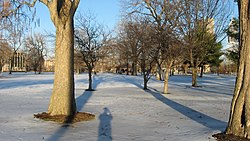Military Park is the oldest urban park in Indianapolis, Indiana, covering 14 acres (6 ha). It is located in western downtown Indianapolis. It was added to the National Register of Historic Places on October 28, 1969.
| Military Park | |
|---|---|
 Military Park in 2011 | |
 Interactive map highlighting Military Park within White River State Park | |
| Type | Urban park, state park |
| Location | White River State Park Indianapolis, Indiana, U.S. |
| Area | 14 acres (5.7 ha) |
| Opened | 1852 |
| Owned by | State of Indiana |
| Operated by | White River State Park Development Commission |
| Open | Daily, 5 a.m. to 11 p.m. |
| Status | Open all year |
Military Park | |
| NRHP reference No. | 69000002[1] |
| Added to NRHP | October 28, 1969 |
History
editThe grounds of Military Park, originally called Military Ground, have seen various uses since the founding of Indianapolis in 1820. The first documented celebration of Independence Day in the city occurred at Military Ground on July 4, 1822. The United States Congress officially gave the land to the state of Indiana in 1827 for use in training the local militias. Prior to 1860, its greatest use for militia training was for the Black Hawk War in 1836.[2][3]
In accordance with the 1851 Indiana Constitution, the land that forms Military Park cannot be sold; only Monument Circle and half of the Indiana State Capitol grounds share this distinction.[4][5] The first Indiana State Fair was held at the park in October 1852. The site continued to be used whenever the fair was held in Indianapolis until 1860 when the fair was moved to what would later become Camp Morton during the Civil War. Stalls and exhibition halls were built on the grounds for the fair, surrounded by a large wooden fence. The state fair made one last appearance on Military Park in 1863.[2]
During the Civil War, Union soldiers were encamped at the park. Governor Oliver P. Morton renamed the park Camp Sullivan, after the 13th Indiana Infantry's Colonel Jeremiah C. Sullivan. It was the first designated camp for the Federal army in Marion County, Indiana. However, this use severely damaged the grounds, due to the different troops entering and leaving Camp Sullivan, as it was a marshaling center. Following the war, efforts by local resident George Merritt started to improve the grounds, with the addition of a fountain and a small pool with a rock foundation of considerable size. Relics from the war and playground equipment were also added, as was a pavilion that still stands.[6][7]
William Jennings Bryan was notified that he would be the Democrat nominee for the Presidency of the United States on August 7, 1900. The two-hour rally was preceded by a march by the candidates from Indianapolis's Union Station.[8]
In 1916, the park was renamed Camp Sullivan Park. Between World War I and World War II, the park began to deteriorate. On October 28, 1969, the park, again known as Military Park, was added to the National Register of Historic Places. The park continued to deteriorate until 1980 when the Lilly Endowment and Krannert Charitable Trust granted funds for its improvement.[9] In 1979, it became part of White River State Park.[10]
In 2007, the park's shelter house was renovated for over $700,000.[11]
See also
editReferences
edit- ^ "National Register Information System". National Register of Historic Places. National Park Service. January 23, 2007.
- ^ a b Bodenhamer 1008
- ^ "Indiana State Historic Architectural and Archaeological Research Database (SHAARD)" (Searchable database). Department of Natural Resources, Division of Historic Preservation and Archaeology. Retrieved August 1, 2016. Note: This includes Wm. B. Barnes (September 1969). "National Register of Historic Places Inventory Nomination Form: Military Park" (PDF). Retrieved August 1, 2016. and Accompanying photographs
- ^ Bodenhamer, David. The Encyclopedia of Indianapolis (Indiana University Press, 1994) pg.1008
- ^ White River State Park Archived 2008-03-22 at the Wayback Machine
- ^ Camp Sullivan (Military Park) Marker
- ^ Bodenhamer 443, 1008, 1009
- ^ All ready at Indianapolis; The Town Completes Arrangements For the Bryan Notification Ceremonies, New York Times, August 6, 1900
- ^ Bodenhamer 1008, 1009
- ^ Bodenhamer 1009
- ^ Shelter House at Military Park Gets a Makeover – Newsroom – Inside INdiana Business with Gerry Dick Archived 2007-08-25 at the Wayback Machine
External links
edit- Media related to Military Park (Indianapolis) at Wikimedia Commons